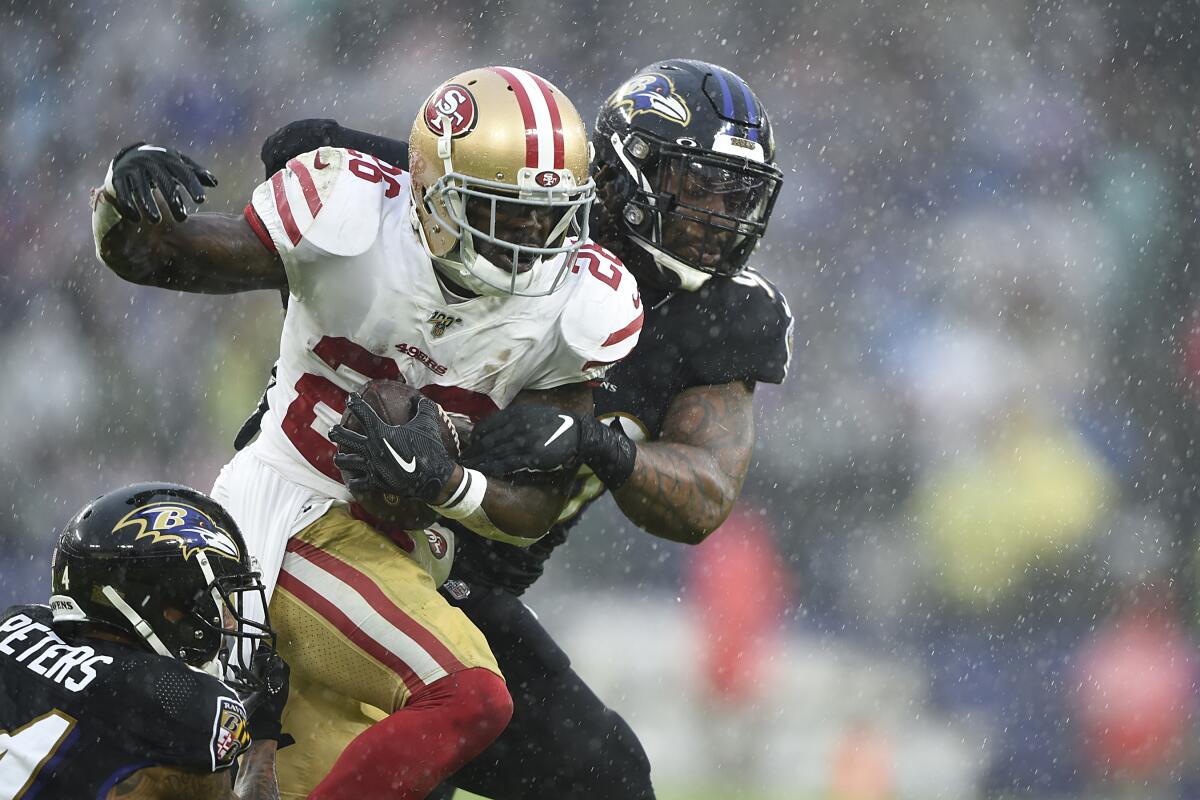Ask Farmer: Why did L.A. not see great game between 49ers and Ravens last weekend?

- Share via
Have a question about the NFL? Ask Times NFL writer Sam Farmer, and he will answer as many as he can online and in the Sunday editions of the newspaper throughout the season. Email questions to: sam.farmer@latimes.com
Why did we in Los Angeles not see that great game between San Francisco and Baltimore last weekend?
Chuck Moore, Glendale
Farmer: You’re not alone, Chuck. There were a ton of frustrated L.A. viewers last week.
The quick answer is, last Sunday was a CBS doubleheader week, meaning that Fox could air only one game. Because the Rams were playing at Arizona in the afternoon, and the Rams are our local team, that was the Fox game we got — even though 49ers-Ravens was an early game.
I’m expecting more emails from frustrated fans this week because San Francisco’s game at New Orleans won’t be shown locally either, and that pits two 10-2 teams vying for the NFC’s top seed.
Once again, it’s a CBS doubleheader week, and the Fox game shown here will be … Chargers at Jacksonville at 1 p.m.
Now, wait a minute. Those are AFC teams. Shouldn’t that be a CBS game?
Theoretically, yes. But here’s what happened: When the NFL released its schedule back in April, Week 14 featured three afternoon games, each with an AFC road team (and therefore qualifying as CBS matchups): Pittsburgh at Arizona, Kansas City at New England, and Tennessee at Oakland. That meant there was no 1 p.m. game for Fox.
So the league had a choice: “cross-flex” one of those three CBS games over to Fox, or come up with a fourth game that could be moved into the Fox afternoon window.
The NFL decided to take the morning Chargers-Jaguars game off CBS, and move it to Fox in the afternoon. Why? That game was going to air in L.A. anyway, because the Chargers are our local team. Plus, West Coast teams always complain about having to play those “body-clock games” on the East Coast, when the players are kicking off at what feels like 10 a.m.
So by moving that game to the afternoon, the NFL did the Chargers a favor and provided Fox its one game of the day. (The Rams play host to Seattle in NBC’s Sunday night game.) CBS then can air a great matchup between the Chiefs and Patriots.
Basically, the NFL and the networks do everything they can to get the best games on TV, and there’s a lot of behind-the-scenes shuffling to do so. Sometimes it works, sometimes it doesn’t.
Howard Katz, the NFL’s senior vice president of broadcasting and media operations, and his crew do a remarkable job of assembling the schedule each offseason and their crystal ball has been really good this season. Viewership numbers are up for all the nationally televised games — on Thursday, Sunday and Monday nights. But when they release the schedule in April, they can’t know that, say, this week’s Baltimore at Buffalo game would be so consequential.
So increased flexibility and nimble maneuvering surely will be a part of the next round of TV negotiations. The league needs to be able to better switch up its scheduling on the fly. Networks pay billions of dollars for TV rights. They want to be able to grab those 49ers-Ravens-type games and get them in as many markets as possible.
That said, the NFL can’t take all the best games and move them to prime time. With all the money they spend for broadcast rights, CBS and Fox expect some good games in their Sunday afternoon packages, as well.
::
On any given offensive play these days you will see all sorts of gesturing, turning and looking over the shoulder, and reaching out to tap adjoining players by offensive linemen. So what constitutes a false start or offsides penalty when there is so much movement and activity right up till the moment of the snap?
Stephen Quinn, Huntington Beach
Farmer: The NFL rulebook reads: “No player of offensive team may charge or move abruptly, after assuming set position, in such manner as to lead defense to believe snap has started.” But that leaves room for a lot of gray area. I asked Rams left tackle Andrew Whitworth about it.
“It’s another one of those rules like so many others that seem to be up for discussion depending on the game,” he said. “It’s supposed to be now that you really can’t do any of that abrupt movement stuff once you’ve been set and you’ve your formation. Any kind of movement could technically be considered a false start if it draws the defense off.
“A lot of times they don’t call it if nobody jumps. But if the defense was to jump offsides, and you had done something abruptly, a lot of times they’ll call that a false start now. But it’s one of those that depends on the officiating crew, how much they care about it or not.”
More to Read
Go beyond the scoreboard
Get the latest on L.A.'s teams in the daily Sports Report newsletter.
You may occasionally receive promotional content from the Los Angeles Times.










